IMPROVING HEALTH OF STEEMIANS #12- Thyroid and Hypothyroidism
Hello my steemit community,

In today's edition of IMPROVING HEALTH OF STEEMIANS, I want to talk with you about Thyroid Gland and Hypothyroidism.
Thyroid - What is it and how does it work?
The thyroid is a gland that looks like a butterfly and it is located in the base of the neck. It is about 2-inches long and has two sides called lobes that lie on either side of your windpipe, and is usually connected by a strip known as an isthmus.
The thyroid gland is made of large follicles in which a colloid is located. Colloid contains thyroglobulin releasing active thyroid hormones, triiodothyronine (T3) and tetrahedronitronine (T4), also called thyroxine.
Apart from follicular cells, the thyroid also contains parafollicular C-cells that produce calcitonin whose basic function is to lower the calcium levels in the blood.
The thyroid belongs to a group of glands that directly secretes their hormones into the bloodstream. The endocrine system of humans is extremely complex, information from the hypothalamus is sent to the pituitary gland which further regulates other glands in the body.
The hypothalamus produces TSH Releasing Hormone (TRH) that signals the pituitary to tell the thyroid gland to produce more or less of T3 and T4 by either increasing or decreasing the release of a hormone called thyroid stimulating hormone (TSH).
If the values of triiodothyronine (T3) and thyroxine (T4) in the blood are low, the pituitary gland releases more TSH into the blood to "make" thyroid gland to produce more T3 and T4 hormones.
If the values of triiodothyronine (T3) and thyroxine (T4) in the blood are high, the pituitary gland releases less TSH into the blood to reduce the production of T3 and T4 hormones.
Normal thyroid hormone production is dependent on adequate iodine intake (iodine is an integral part of the hormone). Lack of iodine in the body leads to an enlarged thyroid called Goiter.
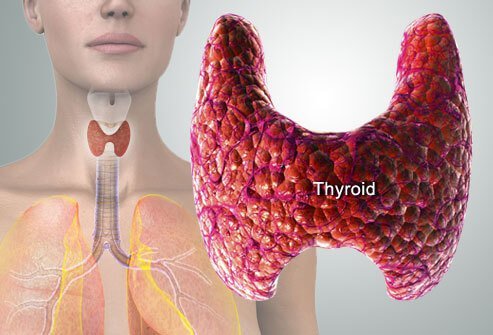
Thyroid hormones regulates almost every body function such as :
breathing
heartbeat
body mass
muscle strength
menstrual cycle
body temperature
blood cholesterol
intestinal mobility
central and peripheral nervous system

INCREASED TSH - CAUSES
There are several possible causes of elevated TSH findings in the blood!
- Thyroid problem
If the thyroid for some reason stops functioning normally, the pituitary gland will produce more TSH to "order" thyroid to increase the production of T3 and T4. Since the thyroid is not working, it can not respond to pituitary ''orders'' so the pituitary gland produces more TSH and then TSH is elevated in the blood.
- Problem with the pituitary gland
Another important cause of elevated TSH findings is the tumor of pituitary gland called Adenoma. It is a benign tumor, but they cause excessive TSH production.
In the case of TSH-associated pituitary adenoma, blood thyroid hormone levels will be elevated because the thyroid gland works normally and responds to elevated TSH.
- Other conditions that cause an elevated TSH finding are:
hypercholesterolemia
subacute thyroiditis
hyperthyroidism with increased levels of fT4 and TSH
amyloidosis
depression
alcoholic liver cirrhosis
pre-eclampsia
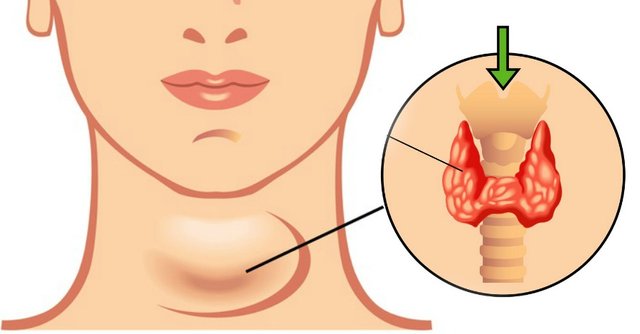
HYPOTHYROIDISM- UNDERACTIVE THYROID
Hypothyroidism is a condition of reduced thyroid hormone production and action. It is the most common cause of elevated TSH.
Hypothyroidism is a widespread disease - occurs in 10% of women and 6% of men over the age of 65.
The most common causes of hypothyroidism are:
Hashimoto's thyroiditis
removed thyroid
treatment with radioactive iodine
lack of iodine
a thyroid hormone secretion and secretion disorder
pituitary diseases
hypothalamus disease
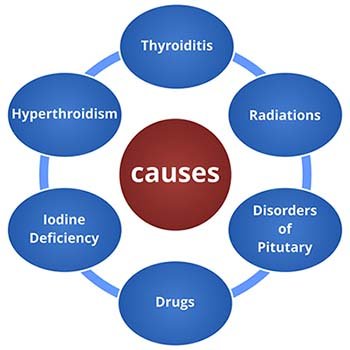
SYMPTOMS
Symptoms of hypothyroidism usually develop gradually and the most important ones are:
weight gain
dry and pale skin
tongue enlargement
muscle weakness
elevated blood cholesterol level
muscle aches, tenderness and stiffness
pain, stiffness or swelling in your joints
heavier than normal or irregular menstrual periods
slowed heart rate
thin hair that often breaks
depression
impaired memory
accumulation of fluid (edema)
swelling of the face
constipation
reduced sex drive
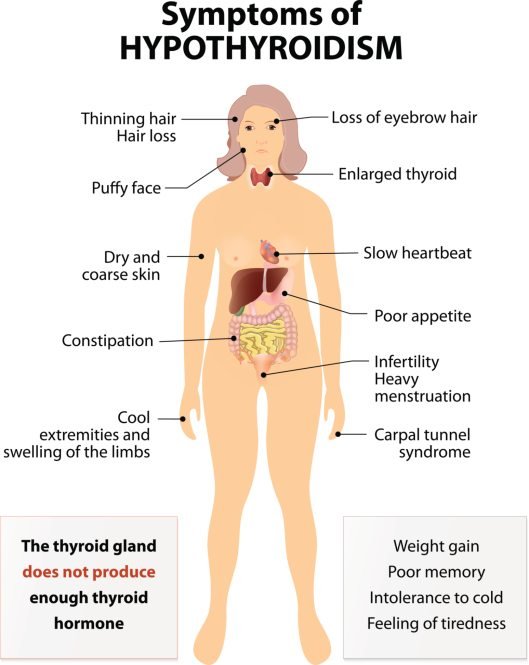
STRESS AND HYPOTHYROIDISM
Stress is increasing the level of cortisol and adrenaline that can exacerbate the symptoms of thyroid disease. Cortisol can stimulate the thyroid gland to "work harder".
When stressed, you are more susceptible to developing autoimmune diseases, such as Hashimoto's thyroiditis.
Stress can also cause subclinical hypothyroidism. Subclinical hypothyroidism means TSH is elevated and T3 and T4 are normal.
HYPOTHYROIDISM- NUTRITION
Without a proper diet there is no healthy thyroid. If you are diagnosed with Hypothyroidism you should increase input of following foods:
- fish (rich in omega-3 and omega-6 fatty acids)
- algae (rich in iodine)
- fiber rich foods - to enhance digestion (fresh vegetables, berries, beans, lentils)
- olive, fish and coconut oil
- whole grains
- Chia seeds
- foods rich in probiotics
- sour vegetables
Reduce input of the following foods:
- gluten
- sugar
- refined flour
- cabbage, kale, broccoli
- sweet potatoes
- peanut
- soy
- caffeine
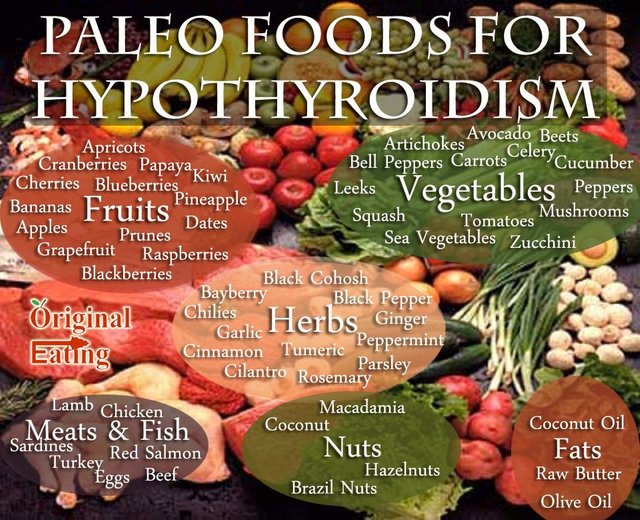
Images source-google image search
TREATMENT
The goal of the treatment is to remove the symptoms and normalize laboratory values of hormones.Standard treatment for hypothyroidism involves daily use of the synthetic thyroid hormone. The prognosis of the disease is excellent if you regularly take therapy.
Treatment is lifelong.
Nice article. Mass amount of mental disorders (mood disorders) are caused by an underlying thyroid malfunction. There are some studies showing that thyroid hormones (T4) can be beneficial as a augmentation therapy in treatment of depression and bipolar.
True, I actually read yesterday one article about it. Its interesting but I need to gather more information about it :)
You are doing a great job bro !
I believe that most of the diseases are controlled by dietry modifications and by doing regular physical exercise. Thyroid disorders are one of them.
Thank you. Yes, I completely agree that most of diseases can be controlled by dietary modifications ;)
Wonderful information! It is good to see medical advice and explanations on the blockchain! Bravo! 😊
Thank you, I'm glad that I can contribute with something to the community :)
Very interesting to see the use of nutrition for treatment.
Thank you. Good nutrition is the key to good mental and physical health :)
Yes sometime I am continuing to work on. Very keen on maximising my intake of fruit and veg - particularly raw. And minimising meat and sugar consumption particularly.
That is great. I know its hard to cut the sugar. I also fail doing that but it is important to set some smart goals and never give up :))
This post has received a 0.93 % upvote from @upmyvote thanks to: @doctorcro. Send at least 1 SBD to @upmyvote with a post link in the memo field to promote a post! Sorry, we can't upvote comments.
https://discord.gg/vFy4d7 I invite you to join air-clinic a community for professional like yourself and health experts, enthusiasts, etc. I think you could help a lot of people over there. So, please come on over to air-clinic. We're ready to welcome you with open arms.
Unfortunately I don't have enough time. I'm working in my clinic plus writing medical posts on steemit. Maybe in the future, when the cold and flu season ends because my clinic is full of patients now .)
Alright. No problemo.
Thank you for that useful information. Happy to have read it. Been battling Hypothyroid for years now. So hate that last line "Treatment is lifelong"
You are welcome. I know but its better to take the medication then to have awful symptoms
Very informative read, seems like I need to get my thyroid tested. Thanks!
If you have symptoms, then definitely :)
This is a good information , and also is great to have a good doctor whit us!!! thanks for share.
Thank you :)